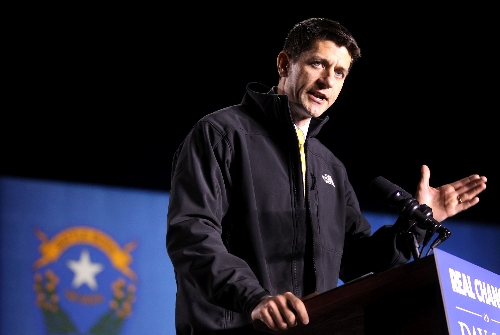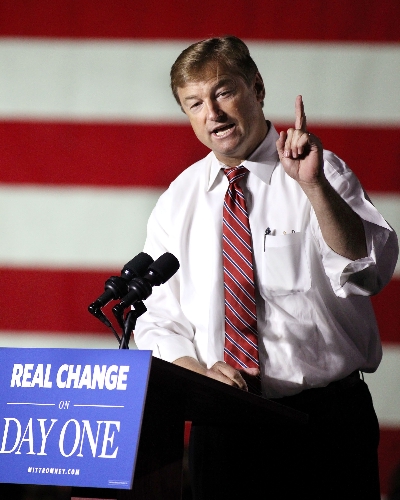Democratic process enters the home stretch Tuesday
After months of negative TV ads fueled by $100 million in campaign spending, a record 1 million Nevadans are expected to vote today in a closely fought election that will determine who wins the White House, a U.S. Senate seat, close congressional contests and control of the state Senate.
Voters also will be asked in ballot question No. 1 whether to give the Nevada Legislature power to call itself into special session. And Clark County ballot question No. 2 asks for a six-year property tax rate increase to fund as much as $720 million in renovation and improvements at about 40 aging schools.
Judges and school board members also are on today's ballot, but the top of the ticket has gotten all of the attention, with Nevada one of a dozen states that could decide the presidency.
President Barack Obama and Republican challenger Mitt Romney have campaigned heavily for Nevada's six Electoral College votes on their way to the 270 needed to win. Obama visited Nevada 10 times during 2012, a presidential record, and Romney has campaigned here more than a half dozen times.
On the eve of the election, Republican vice presidential candidate Paul Ryan told a cheering crowd Monday in Reno that the GOP needs the Silver State.
"Nevada, we're counting on you," Ryan said, speaking in a hoarse voice at an early morning stop in an airport hangar. "We know you can do this. We're in this together."
Ryan said Obama has become what he ran against four years ago, when he easily won Nevada. Instead of cutting the deficit, Obama doubled it, raising the debt to $16 trillion, Ryan said.
About 23 million Americans remain jobless, Ryan added. Nevada leads the nation with 11.8 percent unemployment.
"What we see now is an administration and a presidency littered with broken promises," Ryan told several hundred supporters. "He didn't bring people together. He divided people. He's trying to win by default, and we are simply not going to let him get away with it, are we? We don't have to settle for this."
The Wisconsin congressman led the crowd chanting, "One more day!" And he urged them to round up neighbors and even extended family they're not fond of to get them to the polls today.
Ryan's visit came as he and Romney barnstormed key battleground states on the last day of campaigning. Obama and Vice President Joe Biden crisscrossed the country, too, making their closing pitch for four more years in power.
In Ohio, the big Election Day prize, Obama slammed Romney's economic plan and promise to create 12 million jobs in his first term.
"We know what change looks like. And what he's selling ain't it," Obama said. "Giving more power back to the biggest banks is not change. Another $5 trillion tax cut favoring the wealthy, not change. Refusing to answer questions about the details of your policies until after the election - that's definitely not change."
Romney added a campaign stop in Ohio today, showing the importance of the bellwether state, as well as Pennsylvania, a Democratic-leaning state he's making a play for.
In Nevada, Obama has been edging Romney in polls. Also, Democrats outpaced Republicans during the two-week early voting period, when Nevadans cast more than 700,000 ballots. Democrats accounted for 44 percent of those ballots and Republicans 37 percent, with the rest nonpartisan or third parties. Republicans generally turn out in higher numbers on Election Day, however, giving Romney a shot at an upset here.
The Obama campaign said Romney would have to win 58 percent of the Election Day vote - or nearly three out of five voters - which would be difficult to achieve unless a vast number of independents back the Republican.
"Romney would need the best Election Day turnout operation to upset Obama," said Robert Uithoven, a GOP operative not aligned with the campaign. "If Romney comes up short, it's not going to be because of a lack of any ground game, but because of our inability to register voters."
In the run-up to the election, Democrats outregistered Republicans, giving the party a 90,000-voter advantage in Nevada, nearly the 100,000-voter advantage four years ago, when Obama won.
The outcome of the White House race could affect down-ticket contests, particularly for U.S. Senate.
On Monday, U.S. Sen. Dean Heller, R-Nev., attended the Ryan rally in Reno, where he needs to drive up his voter margin in Washoe County to beat his challenger, Rep. Shelley Berkley, D-Nev.
Heller, who represented Washoe for three terms in the House, is more popular in GOP-leaning Northern Nevada. Berkley, a seven-term congresswoman from Las Vegas, has stronger backing in populous Clark County, her home turf.
Heading into today, Heller has been edging Berkley in public polling, including a survey released Monday by Public Policy Polling, a Democratic group that showed the race a toss-up with Heller edging Berkley, 48 percent to 46 percent.
The poll showed Berkley ahead among those who had voted early, 52-44. But she was far behind Heller among those who said they planned to vote on Election Day, 30 percent to 60 percent for Heller.
Berkley has been weighed down by a House Ethics Committee investigation into whether her work advocating on kidney issues financially benefited her husband, a physician who runs dialysis centers in Southern Nevada.
Berkley could benefit, however, from high Democratic turnout for Obama and from the votes of Latinos, who back her by a 2-to-1 margin (62-31), according to the PPP survey.
On Monday, Berkley toured a Cardenas market in Las Vegas and met with Hispanic voters, her campaign said.
Most analysts believe that if Obama beats Romney by at least 5 percentage points, the president could drag Berkley over the finish line with him, but if the Republican keeps it close or wins, Heller will be the victor.
"I think she's probably the underdog," said Dan Hart, a Democratic operative not associated with Berkley's campaign. "The ground game has to go to the Democrats, and in a very close race that could make the difference. But in the end you're dealing with probabilities, and it's more probable that Heller will win that race."
The presidential race also could affect competitive congressional races.
In the new 4th Congressional District, Republican Danny Tarkanian leads Nevada Senate Majority Leader Steven Horsford, a Democrat, in every public poll. But the Democratic Party has a registration advantage of about 13 percentage points, which could swing the race Horsford's way if turnout is high.
Tarkanian is more widely known, however, as the son of former University of Nevada, Las Vegas, basketball coach Jerry Tarkanian and Las Vegas City Councilwoman Lois Tarkanian. He also has built up a base of supporters during three previous campaigns, while Horsford hasn't faced tough competition since his initial election.
U.S. Rep. Joe Heck, R-Nev., is favored for re-election over state Assembly Speaker John Oceguera, a Democrat, in Southern Nevada's 3rd Congressional District.
Former U.S. Rep. Dina Titus, D-Nev., is expected to easily win the 1st Congressional District, a safe Democratic House seat now held by Berkley. Her opponent is Chris Edwards, a Navy veteran.
In Northern Nevada, U.S. Rep. Mark Amodei, R-Nev., is heavily favored over his Democratic opponent, Samuel Koepnick, a Reno native who works in information technology.
In the Nevada legislative races, Democrats are expected to maintain control of the Assembly, where the party now has a 26-16 advantage.
The Nevada Senate, however, is up for grabs. Democrats now control the Senate, 11-10.
Five seats, including four in Southern Nevada, are hotly contested. Republicans have the fundraising advantage, but Democrats enjoy a registration edge in three of the five districts.
Contact Laura Myers at lmyers@reviewjournal.com or 702-387-2919. Follow @lmyerslvrj on Twitter.
WHERE TO VOTE
Polls are open from 7 a.m. to 7 p.m. today at more than 250 sites across the Las Vegas Valley. Information about locations and procedures is available from the Clark County Election Department at clarkcountynv.gov/vote or call 702-455-8683.
Hey, Las Vegas, tell us about your Election Day experience.
Tweet with hashtag #LVvotes and it will appear on our website.




















